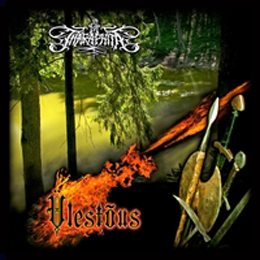
The Estonian band Tharaphita, named after a Baltic god of Thunder and Fire, finally return with a new album. The band was formed two decades ago (initially acting under the moniker of Ancestral Damnation), and after a couple of demos, Tharaphita released their debut full length in 1998 (Raev). Three more albums followed, but after the last one, 2007’s Iidsetel Sünkjatel Radadel, things seemed to fade away. But do not start to cry, because this experienced horde (experienced because these guys are active in other notorious bands too, such as Manatark, Dawn Of Gehenna and Loits, amongst others) strikes back with Ülestõus (meaning: ‘uprising’), which is the first release on the new Estonian label Vaarang Records, the band’s own label, and the first with new bass player Brutalis.
Ülestõus is an eight-tracker that lasts for forty minutes. Once again it’s sung in the band members’ mother tongue, but all lyrics have been translated in English too. And evidently these ones still deal with mythology and history, glory and pride. That fact continues too, of course, within the sonic side of the album.
Ülestõus opens with the title track, and this one immediately shows its strength and persuasion! This song combines epic and melody, but of the kind we’re usually referring in terms of (mostly Scandinavian) majesty. Believe me if I say that I am at least as impressed as I am, more than once, by a Scandinavian act (note to myself: it is not only the North of Europe, evidently, that rules supreme). This track, and the same goes for almost every single piece on the album, sounds very convincing and enormously, yet truly enormously professional and adult! Since I am a fan of the Baltic scene, it is not that remarkable, but what this band brings is so impressive. Really, Ülestõus is such an opener that makes you hungry, thirsty, horny for more! And the rest of the album does not differ that much. The rhythmic epics are full of sound, lacking of falls and mistakes, and breathing both energy and professionalism. The songs are highly melodic, with quite some interesting passages. The speed varies a lot, but is mostly mid- to up-tempo oriented, and the sound is firm yet organic. I never get bored by listening to this album (I guess it’s the fourth time right now); it’s not that there are so many levels to search, but it’s just very enjoyable to experience this persuasive execution and overwhelming power. In general this material sound timeless, and then I mean that this stuff is not purely old styled, nor modernistic, but something in between (one might call it ‘safe’, but in this case not of the fake or cowardly kind!). It is remarkable how easy it seems for this band to combine tremolo leads with victorious rhythms, and still having an own sound and approach, fusing elements from trans-European waves (besides the Baltic and Scandinavian, of course, also the German, Lowlands (BeNe), Polish, Alpine, Iberian, French, Romanian, Hungarian and Ukrainian ones have certain specific comparisons to add – everything except Vatican City, as a matter of fact).
However, there is one remark I have to make, and that might be the lack, though limited, of variation in between the hymns. Sometimes I have the impression I heard a certain piece a couple of minutes before, and let’s not ignore it: the initial structures of the compositions are very comparable. …sometimes little too… It might sound as nit-picking, but one cannot ignore this fact. It’s like a repetition-knob being used during some parts of the recording process… It does not really bother – don’t get me wrong – but it isn’t but honest to write this down.
Don’t consider this album as the most renewing material in years. …because it is not. Yet this album is more than just a decently composed and performed collection of paganized hymns. The members’ experience and knowledge are part of the whole hype I am currently wrestling through, but Tharaphita really deserve to be overloaded with positive superlatives.
